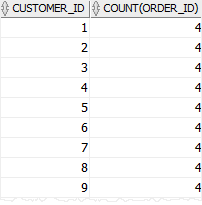Do you want BuboFlash to help you learning these things? Or do you want to add or correct something? Click here to log in or create user.
Tags
#has-images
Question
B) Oracle GROUP BY with an aggregate function example
The following statement returns the number of orders by customers:
Answer
| SELECT customer_id, COUNT ( order_id ) FROM orders GROUP BY customer_id ORDER BY customer_id; |

Tags
#has-images
Question
B) Oracle GROUP BY with an aggregate function example
The following statement returns the number of orders by customers:
Answer
?
Tags
#has-images
Question
B) Oracle GROUP BY with an aggregate function example
The following statement returns the number of orders by customers:
Answer
| SELECT customer_id, COUNT ( order_id ) FROM orders GROUP BY customer_id ORDER BY customer_id; |

If you want to change selection, open document below and click on "Move attachment"
The Ultimate Guide to Oracle GROUP BY with Examples
1 2 3 4 5 6 SELECT status FROM orders GROUP BY status; This statement has the same effect as the following statement that uses the DISTINCT operator: 1 2 3 4 SELECT DISTINCT status FROM orders; <span>B) Oracle GROUP BY with an aggregate function example The following statement returns the number of orders by customers: 1 2 3 4 5 6 7 8 9 SELECT customer_id, COUNT( order_id ) FROM orders GROUP BY customer_id ORDER BY customer_id; In this example, we grouped the orders by customers and used the COUNT() function to return the number of orders per group. To get more meaningful data, you can join the orders table wi
The Ultimate Guide to Oracle GROUP BY with Examples
1 2 3 4 5 6 SELECT status FROM orders GROUP BY status; This statement has the same effect as the following statement that uses the DISTINCT operator: 1 2 3 4 SELECT DISTINCT status FROM orders; <span>B) Oracle GROUP BY with an aggregate function example The following statement returns the number of orders by customers: 1 2 3 4 5 6 7 8 9 SELECT customer_id, COUNT( order_id ) FROM orders GROUP BY customer_id ORDER BY customer_id; In this example, we grouped the orders by customers and used the COUNT() function to return the number of orders per group. To get more meaningful data, you can join the orders table wi
Summary
| status | not learned | measured difficulty | 37% [default] | last interval [days] | |||
|---|---|---|---|---|---|---|---|
| repetition number in this series | 0 | memorised on | scheduled repetition | ||||
| scheduled repetition interval | last repetition or drill |
Details
No repetitionsDiscussion
Do you want to join discussion? Click here to log in or create user.